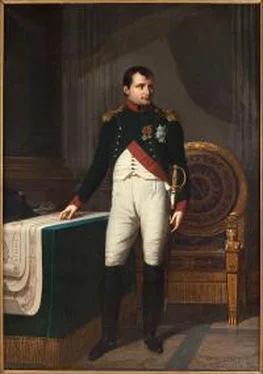Jean Robiquet - Daily Life In France Under Napoleon
Здесь есть возможность читать онлайн «Jean Robiquet - Daily Life In France Under Napoleon» весь текст электронной книги совершенно бесплатно (целиком полную версию без сокращений). В некоторых случаях можно слушать аудио, скачать через торрент в формате fb2 и присутствует краткое содержание. Жанр: История, на английском языке. Описание произведения, (предисловие) а так же отзывы посетителей доступны на портале библиотеки ЛибКат.
- Название:Daily Life In France Under Napoleon
- Автор:
- Жанр:
- Год:неизвестен
- ISBN:нет данных
- Рейтинг книги:4 / 5. Голосов: 1
-
Избранное:Добавить в избранное
- Отзывы:
-
Ваша оценка:
- 80
- 1
- 2
- 3
- 4
- 5
Daily Life In France Under Napoleon: краткое содержание, описание и аннотация
Предлагаем к чтению аннотацию, описание, краткое содержание или предисловие (зависит от того, что написал сам автор книги «Daily Life In France Under Napoleon»). Если вы не нашли необходимую информацию о книге — напишите в комментариях, мы постараемся отыскать её.
Daily Life In France Under Napoleon — читать онлайн бесплатно полную книгу (весь текст) целиком
Ниже представлен текст книги, разбитый по страницам. Система сохранения места последней прочитанной страницы, позволяет с удобством читать онлайн бесплатно книгу «Daily Life In France Under Napoleon», без необходимости каждый раз заново искать на чём Вы остановились. Поставьте закладку, и сможете в любой момент перейти на страницу, на которой закончили чтение.
Интервал:
Закладка:
The author of this note was ahead of events, for the Gregorian calendar, the "dear old man', as people called it, had not yet recovered its legal existence. 1
It became official on January 1, 1806, for the New Year's Day of Austerlitz.
It was used more and more, however, in everyday conversation. The Church employed it to announce its ceremonies, and the Gazette de France to advertise theatrical performances. It was beginning to reappear, too, in the almanacs. The old familiar saints it brought with it found themselves in the company of a rather unexpected colleague, mentioned by Julie Talma:
'The National Almanac sends our Parisians into fits of laughter/ she writes to her friend Benjamin Constant, c they see that the poor devil Saint Roch has been struck out of the calendar and Saint Napoleon has been put in his place — a younger, happier, more amiable saint, no doubt, and more to be recommended. But the old saint's disgrace seems the funniest thing in the world. I didn't specially care for him, but I regret his dog. You know how I love them/ 1 * # * #
During the same period another, no less burning, question was to divide opinion: should the revolutionary formulas be preserved in the language, especially 'Citizen' as a mode of address.
This was a legacy of the Paris Commune, which in 1792 made the word obligatory. In theory it still was so, the measure never having been rescinded. But in the new century, with the change of regime, this mass distribution of citizenship was beginning to appear a bit ridiculous. Ever since the First Consul had taken up his abode in the Tuileries and begun to form a little Court there, it had become evident that changes would have to be made in the official vocabulary.
To make the transition easier, it was first decided to reserve the title of citizen for Frenchmen possessing civic rights. At once the women began to be called madame or mademoiselle, titles that had the advantage of distinguishing between them. Foreign diplomats were baptized Excellences, and the dead, who were doubtless no longer in possession of their civic rights, were qualified as messieurs in their burial certificates.
Very modest reforms so far, but soon to be reinforced by a change in manners. Certain newspapers were already accusing government clerks of 'monsieurizing* too easily, and people in society adopted the habit among themselves, now that the thousands of emigres who had been allowed to return were there to set the tone. There were still placards outside the restaurants bearing the legend 'Here we honour one another with the title of Citizen*, but inside, the customers used the word only to give orders to the staff: 'Citizen Baptiste, clean my boots!' 'Citizeness Angot, open a dozen oysters for me!' Which was hardly enough to prove their love of democracy.
1 Saint Roch devoted himself to nursing victims of the plague, contracted the disease himself, and was saved by a dog, whose master sheltered and cured him. [Translator.]
Other anecdotes were current, to the amusement of Parisians. Two friends broach the eternal subject. "How can you expect me*, says the first, 'to be proud of the title of Citizen when it was borne by Marat and Joseph le Bon?'
'But after all,* says the other., 'Cartouche and Desrues were known as messieurs.' 1
When people start joking on a subject, it soon loses its importance. Revolutionary forms of language were going the same way as the out-of-date festivals, together with the Decadi, the new calendar, in short all the articles of the Jacobin creed. With the approach of the Empire their last partisans would become more and more rare. Some of them would even allow themselves to be converted by grace, like the composer Rey, a young musician attached to the chapel of the Tuileries.
In spite of his post at the Chateau, he still retained the most ardent republican convictions; a bust of Liberty was enthroned on the mantelpiece in his bedroom, and it was to this that he paid his devotions every evening. But it happened that after a concert at which one of his works had delighted the audience, Bonaparte gave orders that the artist should be presented with a gratification of 6,000 francs. Wild with joy, the young man went home, mounted the stairs four steps at a time and spread his treasure before the eyes of the bust.
'See what the tyrant has given me! And you were teaching me to hate him! What have you done for me, false goddess? What have you given me, heart of plaster?' And as the statue made no reply, he hurled it to the ground with a blow of his fist and broke it in a thousand pieces.
We may safely bet that many Frenchmen passed from one regime to the other with equal ease.
1 Cartouche was the famous chief of a band of robbers (.1693-1721), Desrues a notorious poisoner, broken on the wheel in 1719. [Translator].
CHAPTER III. HISTORY SEEN FROM THE STREET
Events and public opinion-Paris celebrates Marengo - July 14, 1800- The festival of the Peace - Transparencies - Bonaparte's little boats —From the moat of Vincennes to Notre-Dame - The Coronation - Stendhal rinses his mouth
THE home life of a country is always bound up with its history and its politics. A generation that has waged war differs from one that has sat about in slippers, and a man who spouts Vive I'Empereur! does not breathe in the same way, does not eat with the same appetite, does not sleep the same sleep as he would if he shouted 'Down with the tyrant!'
To understand the French between 1800 and 1815 one must always bear in mind the events of which they were witnesses. During those perpetual wars they went through alternations of enthusiasm and lassitude, and their daily life was affected by the rebound. To follow this reaction of events on opinion, and of opinion on life, to trace the curve of this collective fever, would lead us too far from a simple chronicle of manners; but we may take a look at those occasions during the Consulate and the Empire when popular feeling expressed itself most forcibly.
Great events in which whole towns were involved, departure and return of armies, celebrations, public ceremonies, following on one another in quick succession for fifteen years, came to seem a part of daily life. They were history seen from the street, a series, as it were, of popular prints in simple, garish colours, in the first of which we behold the huge joy of the capital at the news of Marengo.
No success could have been more brilliant or more unexpected. Unpleasant rumours had been rife all the week. It was known that Massena had capitulated in Genoa, and only the day before Carnot had received a message that made a retreat by Bonaparte seem likely, and the funds had dropped ten points. But suddenly, on the 2nd Messidor, a second courier, arriving in the morning, announced that the Aus-trians had been crushed: the Armistice had been signed, it was a dazzling victory.
At two o'clock the cannon thundered, and soon posters appeared confirming the event. Italy is taken! The words echoed everywhere in a continuous murmur. People came pouring out like a waterspout from the houses, the shops, the workrooms, spreading over the squares, dancing in circles, lighting bonfires. They were all embracing, congratulating one another 'as if on some happy family event'.
In the evening rejoicings started afresh. When Mme Pennon and her daughter, whom we met at the Theatre Fey-deau, returned after dinner from their country estate of Saint-Maude, they guessed the great news from the general intoxication of the crowd. All the inhabitants of the Saint-Jacques quarter, of the Place Maubert and of the Cite, had fathered on the site of the old Bastille, the place where Paris ad grown accustomed to dance, and the workmen of the Faubourg Saint-Marceau had crossed the Seine by boat to join them there.
Читать дальшеИнтервал:
Закладка:
Похожие книги на «Daily Life In France Under Napoleon»
Представляем Вашему вниманию похожие книги на «Daily Life In France Under Napoleon» списком для выбора. Мы отобрали схожую по названию и смыслу литературу в надежде предоставить читателям больше вариантов отыскать новые, интересные, ещё непрочитанные произведения.
Обсуждение, отзывы о книге «Daily Life In France Under Napoleon» и просто собственные мнения читателей. Оставьте ваши комментарии, напишите, что Вы думаете о произведении, его смысле или главных героях. Укажите что конкретно понравилось, а что нет, и почему Вы так считаете.












